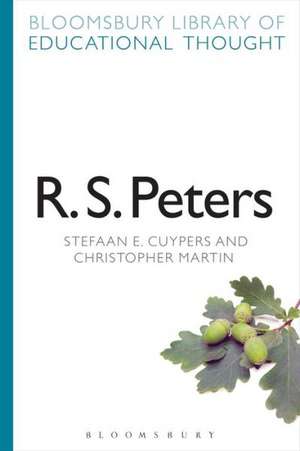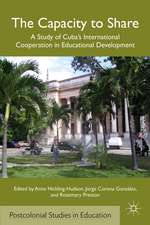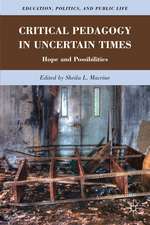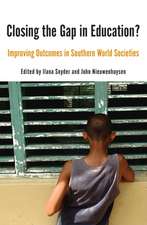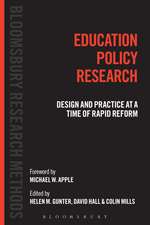R. S. Peters: Bloomsbury Library of Educational Thought
Autor Professor Stefaan E. Cuypers, Christopher Martin Professor Richard Baileyen Limba Engleză Paperback – 22 oct 2014
This text undertakes a careful and accessible reconstruction of the major themes of Peters' thought in order to demonstrate the continuing relevance of his project, both for educational researchers and teachers and student teachers seeking to better understand the nature and scope of their work and study.
Din seria Bloomsbury Library of Educational Thought
- 13%
 Preț: 251.83 lei
Preț: 251.83 lei - 22%
 Preț: 250.45 lei
Preț: 250.45 lei - 13%
 Preț: 250.55 lei
Preț: 250.55 lei - 13%
 Preț: 251.39 lei
Preț: 251.39 lei - 13%
 Preț: 251.57 lei
Preț: 251.57 lei - 13%
 Preț: 250.45 lei
Preț: 250.45 lei - 13%
 Preț: 251.83 lei
Preț: 251.83 lei - 13%
 Preț: 250.45 lei
Preț: 250.45 lei - 13%
 Preț: 256.12 lei
Preț: 256.12 lei - 13%
 Preț: 250.01 lei
Preț: 250.01 lei - 13%
 Preț: 251.39 lei
Preț: 251.39 lei - 13%
 Preț: 253.75 lei
Preț: 253.75 lei - 13%
 Preț: 251.83 lei
Preț: 251.83 lei - 13%
 Preț: 257.50 lei
Preț: 257.50 lei - 13%
 Preț: 256.12 lei
Preț: 256.12 lei - 13%
 Preț: 257.97 lei
Preț: 257.97 lei - 13%
 Preț: 250.45 lei
Preț: 250.45 lei - 13%
 Preț: 252.42 lei
Preț: 252.42 lei -
 Preț: 300.62 lei
Preț: 300.62 lei -
 Preț: 251.51 lei
Preț: 251.51 lei -
 Preț: 238.53 lei
Preț: 238.53 lei -
 Preț: 272.29 lei
Preț: 272.29 lei -
 Preț: 274.53 lei
Preț: 274.53 lei -
 Preț: 273.86 lei
Preț: 273.86 lei
Preț: 225.49 lei
Preț vechi: 288.94 lei
-22% Nou
Puncte Express: 338
Preț estimativ în valută:
43.15€ • 45.05$ • 35.71£
43.15€ • 45.05$ • 35.71£
Carte indisponibilă temporar
Doresc să fiu notificat când acest titlu va fi disponibil:
Se trimite...
Preluare comenzi: 021 569.72.76
Specificații
ISBN-13: 9781472518798
ISBN-10: 1472518799
Pagini: 264
Dimensiuni: 156 x 234 x 15 mm
Greutate: 0.41 kg
Editura: Bloomsbury Publishing
Colecția Bloomsbury Academic
Seria Bloomsbury Library of Educational Thought
Locul publicării:London, United Kingdom
ISBN-10: 1472518799
Pagini: 264
Dimensiuni: 156 x 234 x 15 mm
Greutate: 0.41 kg
Editura: Bloomsbury Publishing
Colecția Bloomsbury Academic
Seria Bloomsbury Library of Educational Thought
Locul publicării:London, United Kingdom
Caracteristici
Provides
both
a
useful
overview
and
synthesis
of
Peters'
key
work
in
the
field
in
one
volume,
saving
students
valuable
research
time
Notă biografică
Stefaan
E.
Cuypersis
Professor
of
Philosophy
at
the
KU
Leuven
University,
Belgium.
He
works
in
philosophy
of
education,
philosophy
of
mind
and
epistemology.
He
is
the
author
ofSelf-Identity
and
Personal
Autonomy(2001),
the
co-author,
together
with
Ishtiyaque
Haji,
ofMoral
Responsibility,
Authenticity,
and
Education(2008),
and
an
invited
contributor
toThe
Oxford
Handbook
of
Philosophy
of
Education(2009),
edited
by
Harvey
Siegel.Christopher
Martinis
Assistant
Professor
of
Education
at
the
University
of
British
Columbia,
Kelowna,
Canada.
He
works
in
philosophy
of
education,
moral
and
political
philosophy
and
moral
education.
He
is
the
author
ofEducation
in
a
Post-Metaphysical
World:
Rethinking
Educational
Policy
and
Practice(2012)
and
co-editor,
together
with
Stefaan
E.
Cuypers,
ofReading
R.
S.
Peters
Today.
Analysis,
Ethics
and
the
Aims
of
Education(2011).
Cuprins
Series
Editor's
PrefaceForewordAcknowledgementsPart
I:
Intellectual
Biography
of
R.S.
Peters1.
Peters'
Analytic
Paradigm
in
the
Philosophy
of
EducationPart
II:
Critical
Exposition
of
R.S.
Peters'
Educational
Thought2.
The
Concept
of
Education,
Aims,
and
Educational
Processes3.
Initiation
and
the
Educated
Person4.
The
Ethical
Justification
of
Education
5.
Liberal
Education,
the
Quality
of
Life,
and
Teacher
Training6.
Comprehensive
Moral
Education
and
Personal
Autonomy
7.
Educating
the
Emotions
and
the
Life
of
ReasonPart
III:
Reception
and
Relevance
of
R.S.
Peters'
Work8.
The
Impact
and
Importance
of
Peters'
Analytic
ParadigmNotesBibliographyIndex
Recenzii
An
essential
and
long
overdue
critical
guide
to
the
work
of
the
most
significant
educational
philosopher
of
the
20th
century.
Informative,
comprehensive,
well
organised
and
clearly
written,
it
brings
out
the
breadth,
scope,
and
practical
relevance
of
Peters'
work.
Particularly
to
be
noted
is
the
authors'
awareness
of
Peters'
recognition
of
the
social
context
of
educational
discourse.
Cuypers and Martin reveal the richness of Peters' thinking about education, including his concern for the human condition and the predicaments of life, and his emphasis on the moral value of the work done by those engaged in the educational enterprise. Erudite, yet written with ease and clarity, their book shows both the overarching trajectories and nuanced details of Peters' thought. This book is a great companion for readers already familiar with Peters' work, as well as for those looking for an entry point into the complexity of his central ideas. The authors demonstrate the relevance of philosophy of education as a unique discipline that can significantly contribute to contemporary discussions on educational policy and practice.
The late Richard Stanley Peters was the British architect of post-war philosophy of education as a worthwhile branch of modern analytical philosophy and a philosopher of global significance and reputation. Hard on the heels of his recent passing, this clear, accomplished and overdue appreciation and celebration of Peters work - by two distinguished contemporary educational philosophers of Peters' own analytical temper and rigour - could hardly be more timely, and one may be certain that it would have been received with much pride and gratitude by the subject of this study himself. Like Peters' own output, this work is a shining example of philosophical insight and clarity at its best, and - for this as well as its subject matter - should be compulsory reading for all who might aspire to contribute further serious work to the field of philosophy of education.
Cuypers and Martin reveal the richness of Peters' thinking about education, including his concern for the human condition and the predicaments of life, and his emphasis on the moral value of the work done by those engaged in the educational enterprise. Erudite, yet written with ease and clarity, their book shows both the overarching trajectories and nuanced details of Peters' thought. This book is a great companion for readers already familiar with Peters' work, as well as for those looking for an entry point into the complexity of his central ideas. The authors demonstrate the relevance of philosophy of education as a unique discipline that can significantly contribute to contemporary discussions on educational policy and practice.
The late Richard Stanley Peters was the British architect of post-war philosophy of education as a worthwhile branch of modern analytical philosophy and a philosopher of global significance and reputation. Hard on the heels of his recent passing, this clear, accomplished and overdue appreciation and celebration of Peters work - by two distinguished contemporary educational philosophers of Peters' own analytical temper and rigour - could hardly be more timely, and one may be certain that it would have been received with much pride and gratitude by the subject of this study himself. Like Peters' own output, this work is a shining example of philosophical insight and clarity at its best, and - for this as well as its subject matter - should be compulsory reading for all who might aspire to contribute further serious work to the field of philosophy of education.
